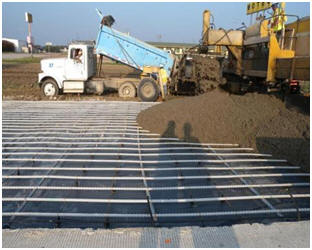Project 5-4035
Construction and Evaluation of Post-Tensioned Pre-Stressed Concrete Pavement
Abstract
The performance of cast-in-place post-tensioned concrete pavement (PCP) constructed in 1985 on IH-35 in Waco, Texas has been excellent. Encouraged by the performance of the section, the Texas Department of Transportation decided to build another PCP project on IH-35 in Hillsboro. The construction of 9-in thick PCP with mostly 300-ft long slabs started in May 2008. Issues raised during the pre-construction and construction phases were evaluated and documented in this report. Also, the detailed behavior of PCP at early ages due to environmental loading (temperature and moisture variations) and post-tensioning were evaluated with various installed gages. The strain and movement of PCP as well as temperature and relative humidity were measured. The effects of such factors as post tensioning (PT) force, friction, curling stress, creep, and shrinkage on the behavior of PCP were investigated. The stress introduced by longitudinal PT varied along the slab length, with a maximum near the armor joint and a minimum at the center of the slab. The concrete strain at mid-depth of the slab under environmental loading was also affected by friction and other restraints. The concrete thermal strain restrained by friction and other factors was larger near the slab center. The distribution of longitudinal slab movement was nonlinear along with the distance from slab center. Continued contraction of concrete slab due to creep and shrinkage was observed, one which will result in the opening of joint width. Creep and shrinkage effects should be included in the design of the initial joint width. The findings from the field evaluations of the PCP behavior were used to calibrate the theoretical analysis model PCP 3.0.

Project PI: Moon Won
Center for Multidisciplinary Research in Transportation (TechMRT)
-
Address
Texas Tech University, Box 41023, Lubbock, TX 79409-1023 -
Phone
806.742.3523 -
Email
techmrt.outreach@ttu.edu
